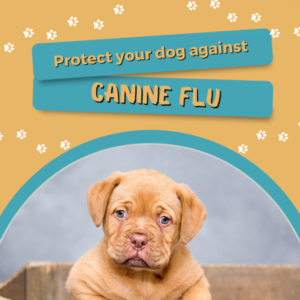 What Causes Canine Influenza in Dogs?
What Causes Canine Influenza in Dogs?Canine influenza is a highly contagious virus that your dog is most likely to contract in crowded canine settings like dog parks, pet stores, boarding kennels, groomers, dog shows, or doggie daycare. The virus can also be carried into your home (on your hands, clothes, and shoes) and passed on to your dog in this manner. As a result, after coming into contact with any potentially sick canines, you should wash your hands and change your clothes before handling your own pet.
Canine Influenza Symptoms
The symptoms and severity of the infection vary from dog to dog, and it can linger for several weeks, just like the flu in humans. The following are some of the most prevalent symptoms of canine influenza:
- Appetite suppression
- Fever is really high.
- Cough
- a stuffy nose
- Sneezing
- Lethargy
What You Can Do to Help Your Dog?
Immunizations for Canine Influenza: Vaccinating your dog against the flu is the greatest approach to help prevent them against the infection. The canine influenza vaccine is quite successful in preventing canine influenza. At your next consultation with your veterinarian, inquire about the immunisation.
Hydration : Hydration Keep your dog’s respiratory tract healthy and functioning properly by giving him lots of fresh water to drink and utilising humidifiers around the house as needed.
Stay away from the communal water bowl: Continue walking if you encounter a water bowl on the sidewalk while out on a walk. Bacteria and viruses such as canine influenza can live in shared water bowls.
Stay away from sick dogs: If you come across a sick dog, do not allow your dog to sniff it or engage with it. It’s important to remember that dogs are very contagious even before they show any indications of illness.
Make Certain That Your Favorite Spots Are Clean: To reduce the chance of a flu outbreak, make sure your favourite spots to frequent with your dog are adequately disinfected.
Do you suspect your dog is infected with the flu?
Make an appointment with your veterinarian right away if you suspect your dog has the flu. It could be the flu, but it could also be kennel cough, pneumonia, or any of a number of other illnesses. Your veterinarian will be able to assist you with this.
Supportive care, such as the following, may be recommended by your veterinarian to help your dog recover faster:
Resting
To keep mucus moving, create a relaxing environment and encourage modest activity.
Eating
Wet food with chicken or beef stock to stimulate appetite (no onions or garlic, though).
Hydration
Encourage them to drink more water by flavouring it with stock, adding water to their food, or include more wet food in their diet.
Humidification
Use a humidifier in the area where your dog is resting or create a humid environment in the bathroom with the shower running.
Tissue, cotton balls, or cotton pads
Use warm water to dampen these and use them to wipe mucus off your dog’s nose.

